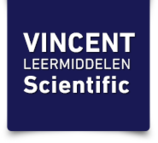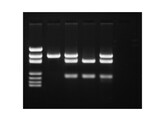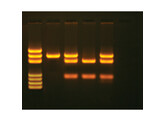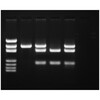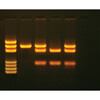Suppressor genes such as p53 are essential for cell functions.
This protein is central to a signalling cascade that regulates cell growth and apoptosis. It is thus important in the cell cycle. When cell damage occurs, it has 2 options: stopping cell growth in the G1 phase (where DNA can be repaired) or apoptosis (if the damage is too bad). When the DNA has suffered minor damage, the p53 protein will become active and stop cell division. The damage can be repaired after which the cell continues to divide. If the damage is too great and cannot be repaired, this same protein will transmit apoptotic signals. The cell disintegrates and is cleared by macrophages.
In many cases of cancer, this gene (p53) is suppressed and the protein is no longer produced. Mutations in genes can be inherited or accumulated as a result of environmental influences. This experiment deals with a pedigree determination of several generations regarding cancer formation due to p53 gene mutation.
This experiment does not contain human DNA.
The kit contains: DNA samples, UltraSpec agarose, electrophoresis buffer, ethidium bromide, five autoradiograms.
Also required: electrophoresis apparatus, micropipettes, balance, microwave or heating plate, water bath 65 degrees Celsius, UV transilluminator, 250 ml flasks, distilled or demineralised water.
Edvotek 314 - included with the product in the box is a link to the most recent online manual (in English)
This protein is central to a signalling cascade that regulates cell growth and apoptosis. It is thus important in the cell cycle. When cell damage occurs, it has 2 options: stopping cell growth in the G1 phase (where DNA can be repaired) or apoptosis (if the damage is too bad). When the DNA has suffered minor damage, the p53 protein will become active and stop cell division. The damage can be repaired after which the cell continues to divide. If the damage is too great and cannot be repaired, this same protein will transmit apoptotic signals. The cell disintegrates and is cleared by macrophages.
In many cases of cancer, this gene (p53) is suppressed and the protein is no longer produced. Mutations in genes can be inherited or accumulated as a result of environmental influences. This experiment deals with a pedigree determination of several generations regarding cancer formation due to p53 gene mutation.
This experiment does not contain human DNA.
The kit contains: DNA samples, UltraSpec agarose, electrophoresis buffer, ethidium bromide, five autoradiograms.
Also required: electrophoresis apparatus, micropipettes, balance, microwave or heating plate, water bath 65 degrees Celsius, UV transilluminator, 250 ml flasks, distilled or demineralised water.
Edvotek 314 - included with the product in the box is a link to the most recent online manual (in English)
Properties
- F778314
